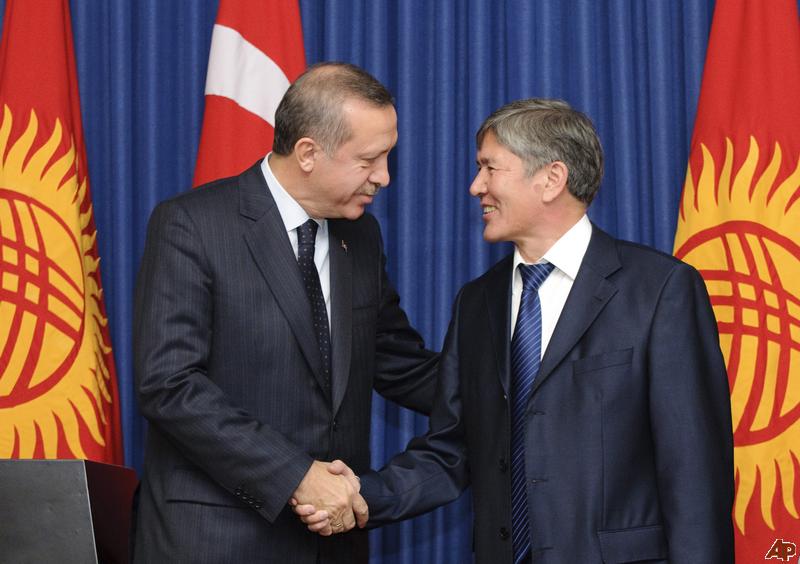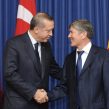
Atambayev Invites Turkey to Decide on US Transit Center’s Future
Publication: Eurasia Daily Monitor Volume: 9 Issue: 13
By:

Although the newly-elected Kyrgyz President, Almazbek Atambayev, received significant Kremlin support in the run up to last year’s elections, Turkey was his first formal destination as the head of state. During a meeting with the Turkish Prime Minister Recep Tayyip Erdogan Atambayev invited Turkey, along with Russia and “other states,” to participate in restructuring the US Transit Center at Manas after US and NATO troops leave in 2014.
By raising the issue of the US base, Atambayev has incorporated Turkey, a NATO member, in Bishkek’s wider efforts to balance its foreign policy between Moscow and Washington. Some pro-Russian political analysts viewed the president’s statement as an insult to the Kremlin (www.rosbalt.ru, January 16).
The Kyrgyz president’s trip to Turkey comes less than one year after Erdogan’s visit to Bishkek. In February 2011, Erdogan also showed interest in inviting Russia to attend Kyrgyz-Turkish talks on regional issues. Then, the Turkish leader praised Kyrgyzstan’s efforts to build a parliamentary democracy and promised to continue supporting the country’s political reforms. Erdogan, showcasing his country’s parliamentary system, called on Kyrgyz politicians to strengthen civic liberties and allow greater political competition (see EDM, February 8, 2011). Turkey has not issued any statement on the future of the US Transit Center in Bishkek.
Kyrgyzstan’s relations with Turkey have always been stable regardless of the changes in the political leadership in both countries. This is in sharp contrast to Bishkek’s fluctuating relations with Russia and the United States, which often compete over geostrategic influence in the wider region. Kyrgyz-Turkish ties received a further boost after Atambayev won the presidential election. This is largely due to good personal relations between Atambayev and Turkish President Abdullah Gul. Atambayev speaks fluent Turkish and owns business assets in Turkey, according to the Kyrgyz media.
By building closer ties with Ankara, Atambayev risks further delaying an installment of the $106 million loan from Russian-led Eurasian Economic Community’s (EurAsEc) anti-crisis fund. The allocation of funds has already been postponed from November 2011 until the spring of this year. Kyrgyzstan started 2012 without an approved budget, and has an 18 billion som deficit (over $400 million), while desperately needing foreign aid. Uncertainty over the Russian loan has forced Kyrgyzstan’s leadership to look for economic assistance from other sources. While in Turkey, Atambayev appealed to Turkish businessmen to invest in the Kyrgyz economy, thanking Ankara for writing off its $51 million debt last year. In addition, Turkey has promised to allocate a $21 million credit to Kyrgyzstan (www.knews.kg, January 16).
A group of Turkish businessmen will soon visit Kyrgyzstan to consider investments in communication, aviation, energy, mining, textile and manufacturing (www.tazabek.kg, January 16). Turkey has long been a favorite destination for Kyrgyzstan’s students, businessmen and tourists. Its popularity continues to increase as both countries maintain a visa-free regime. Two Turkish universities function in Kyrgyzstan: the Kyrgyz-Turkish University in Manas and the International University in Ataturk-Ala-Too. There are also two state colleges – one for males and one for females. More than a dozen Turkish-sponsored “Sebat” colleges function throughout the country.
Kyrgyzstan is by far not the biggest market for Turkish businessmen in Central Asia, but the country’s dire economic situation might open up space for Turkey in the country’s political realm. By placing the issue of the US transit center on the table, Atambayev has indicated that he consulted with the Turkish leadership on Ankara’s possible role in Kyrgyzstan’s foreign policy. Furthermore, Kyrgyzstan is currently trying to attract China and Turkey to join its energy projects.
Meanwhile, Russia is actively trying to reinforce its position in the region. On December 20, 2011, the Collective Security Treaty Organization (CSTO) adopted a protocol according to which military bases will be allocated in the region only with the consent from all member states (Interfax, December 21, 2011).
On January 12, Kyrgyzstan’s Foreign Minister, Ruslan Kazakbaev, told journalists that the president’s official visit to Turkey has no implications for the US military base, as the agreement was signed before the new CSTO protocol.
“It is a new page in Kyrgyz-Turkish relations,” Atambayev said on his return to Bishkek (www.ca-news.org, January 16). He argued that Kyrgyzstan’s common Turkic heritage with Turkey offers a base for peaceful and productive relations. “Kyrgyzstan is located far from Turkey, but every Kyrgyz citizen knows that for the Kyrgyz, Turkey is a star, a Motherland that shows us the way,” the president said.




